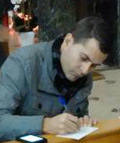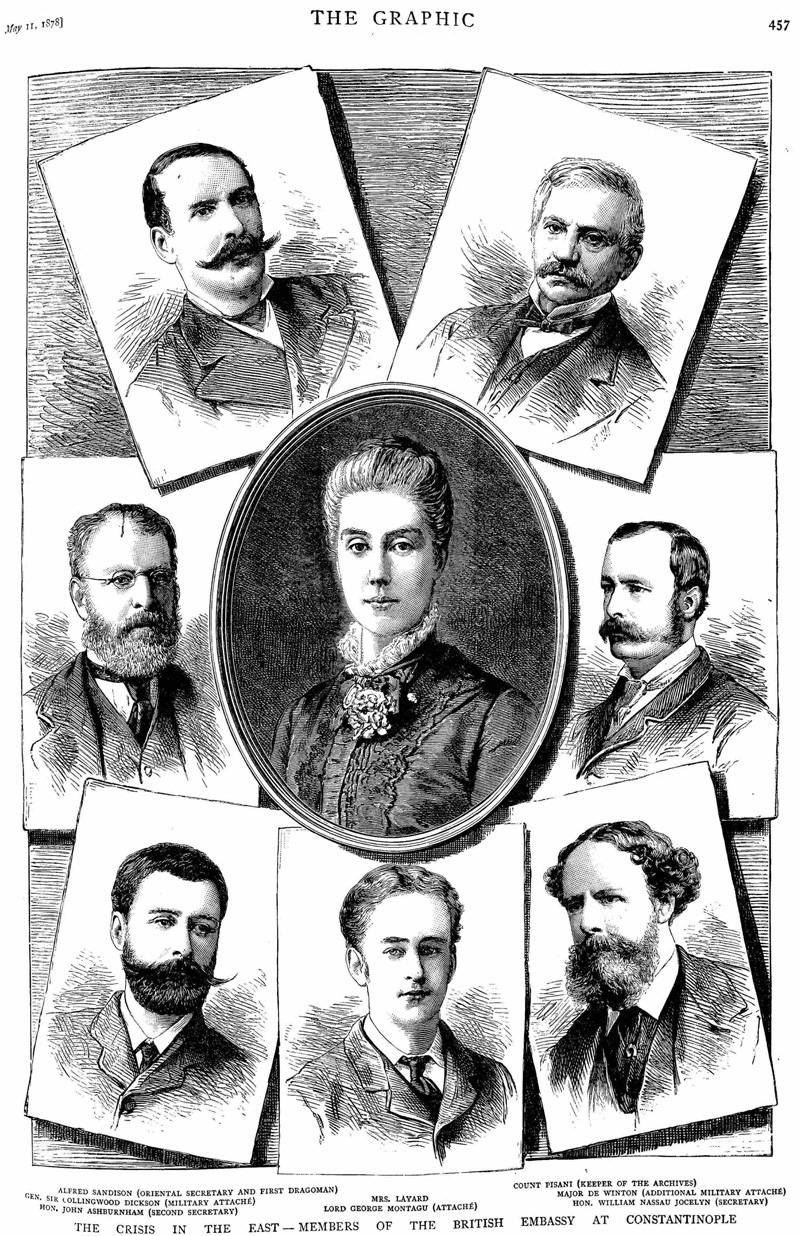
The Interviewees
Herve Georgelin | Pelin Böke | Alex Baltazzi | Axel Corlu | Philip Mansel | Antony Wynn | Fortunato Maresia | Vjeran Kursar | Christine Lindner | Frank Castiglione | Clifford Endres | Zeynep Cebeci Suvari | Sadık Uşaklıgil | İlhan Pınar | Ümit Eser | Bugra Poyraz | Oğuz Aydemir

Interview with Frank Castiglione, June 2015
1- When did your interest in the Levant, Ottomans and dragomans commence?
My general interest in the history of the Ottoman Empire and the Turkish Republic began during my undergraduate years at McMaster University. I then focused on the history of the early Turkish Republic during my studies for my Master of Arts degree in Turkish Studies at Leiden University, but gradually moved backwards to study the socio-political history of the nineteenth century Ottoman Empire when I started my doctoral studies at the University of Michigan. With that, I started to become intrigued with dragomans that were members of the Levantine community in Istanbul. I was particularly interested in their roles as intermediaries between empires.
2- How far back can we take the concept of dragomans? Is it a purely Ottoman phenomenon?
I think dragomans in the Ottoman Empire are unique, though they are not a purely Ottoman phenomenon. Translators/interpreters were used by travellers, merchants, and states to facilitate contact and to engage with indigenous populations and governments. They were used in Asia, South Asia, and the Americas. I do not know an exact date for when the concept of dragoman, which comes from the Arabic tardjumān and then the Ottoman-Turkish tercüman, meaning a translator and/or interpreter, began. Though I have read that the act of interpretation goes back to before the beginning of written languages. I think that dragomans are often too easily viewed as having been subordinate or marginal actors simply tasked with interpreting between parties and translating various communiqués. In fact, their repertoires of political and social action were quite malleable, and brought them into contact with all sorts of Muslim and non-Muslim bureaucrats, merchants or traders, visitors to the empire, and of course members of the Levantine community. They formed connections with a lot of these people and because of that they were able to straddle socio-political, ethno-linguistic and religious boundaries. What made dragomans so unique in the Ottoman Empire was that they were ostensibly situated between more than one culture, empire, and political and economic system, yet they managed to have a profound way of operating inside of these empires, just as much as they did in-between them. That was largely attributed to their knowledge of Ottoman and European cultures, legal structures, and rules and procedures. Dragomans also had deep networks that cut across cultural and religious boundaries, which allowed them to form ventures and have other interests outside of their duties as dragomans for the foreign embassies and consulates operating in the Ottoman Empire. What this meant was that dragomans could operate in many different sectors of society and on different levels.
3- Were the Pisani family a ‘dragoman family’ or did they also have members engaged in pure trade? Or do you think having a family member in that position helped create better trade conditions and contacts?
A number of members followed the family tradition of becoming dragomans. Some served the British embassy, and others the Russian and Austrian embassies in Istanbul. Other members did in fact go outside of the family tradition. To name a few examples, Nicholas Pisani (b. 1809) worked in the financial sector of Istanbul, and so too did George Pisani (b. 1841). Antoine Pisani (b. 1853) was an editor for the newspaper The Levantine Herald, and Edouard Pisani (b. 1854) was a sous chef. Having relatives employed as dragomans at a European embassy was probably valuable for other family members. Such a connection could mean access to critical legal information about finance and trade from an Ottoman and European perspective. It could also have an effect on conflict-resolution when a family member enlisted the support of the embassy. When Nicholas Pisani teamed up with a partner to provide a loan for Serfiraz Hanımefendi, a favourite of Sultan Abdülmecid I and her kahvecibaşı (coffee preparer) Osman Effendi in the mid-nineteenth century, they went through a protracted process to recoup the money that they had lent. Nicholas and his children received quite a bit of support from the British Embassy in that process, probably because his brothers Count Alexander and Etienne were employed by the embassy. As for whether or not being part of a dragoman family were important in connecting their relatives with better contacts and conditions for trade, I would conjecture that was probably the case, though I have not come across any hard evidence to support that. I have yet to see any instances of members of this family engaged in international trade.
4- Were the dragomans expected to be a ‘neutral translator’ by either side; did they ever openly demonstrate national allegiances? Was there any form of training provided by the various diplomatic organs?
Dragomans generally received training from the embassies and imperial governments that employed them. The French and Austrians had schools specifically for that purpose, though keep in mind that they were training their own nationals and not members of the Levantine community. Up until the late nineteenth century, the British still relied on mainly Levantines to act as their dragomans at the embassy in Istanbul. But one British-born dragoman, George Wood had served alongside the Pisanis in the early nineteenth century. His son Richard also took up a position as a dragoman for the embassy. Though Richard was born in Istanbul, he was viewed as something of a British/Levantine hybrid, but more ‘British’ because he was born to a British father. Henry Simmons, another dragoman, was also of British extraction though he too was born in Istanbul. It was not until 1877 when the British had a system in place for training their own nationals to become dragomans. As points of contact between the Ottoman Empire and the European empires that employed them, dragomans were expected to be impartial when translating and interpreting. That does not mean that charges of partisanship or falsity were not brought against dragomans. Nicolas Navoni was once called out and subsequently fired by Commodore Porter, a representative for the American embassy in Istanbul for relaying false information between him and the Reis Efendi (Ottoman Minister for Foreign Affairs). Dragomans, and particularly those from the Levantine community were also not always trusted and did not have the best reputation among the foreign legations and local actors in Istanbul. If you look at the foreign press, or travelogues and memoirs of various people in different periods, dragomans were not always highly regarded and often referred to as untrustworthy and self-serving, looking to line their own pockets.
5- Naturally as the 19th century progressed strains increased between an Ottoman Empire shrinking in size and power while European nations and their representatives, be they ambassadorial or Levantine, gained power and banking and the debt burden was part of the necessary evil to prop up a bankrupt state. Were dragomans viewed with increasing suspicion by the Ottoman state apparatus as the conditions of the Empire worsened?
I think that dragomans, whether they were members of the Levantine community or not, were generally regarded with suspicion in the Ottoman Empire even before European empires took control of much of the Ottoman financial and banking sectors. As I previously mentioned, there was a stigma of distrust attached to dragomans, and that was held by Europeans and Ottomans alike. After the outbreak of the Greek Revolt/War of Independence in 1821, Phanariot dragomans (members of the Orthodox Christian community based in the Phanar district of Istanbul) who were associated with the Ottoman government and appointed to the positions of the imperial dragoman, the dragoman of the fleet, and the two voyvodas of Wallachia and Moldavia were dismissed because they seemingly could not be trusted. The Ottomans then created the Translation Office of the Sublime Porte (Bab-ı Âli Tercüme Odası) not only to ensure that Ottoman-Muslim subjects filled the role of translators/interpreters by the Porte, but also to expand the bureaucracy of the Sublime Porte.
6- As the widow of the late Etienne Pisani, petitioning on behalf of investors that backed the bank idea of his, she was presumably doubly disadvantaged of not being a full foreigner and a woman? Do you think these were factors that determined the rejection of the bank proposal or do you think there were other factors in the decision mix?
In 1882, the same year of his death, Etienne applied for and was granted an imperial ferman to open a ‘bank’ or ‘Mount of Piety’ in Istanbul. Four years later his widow, Helene Timoni, petitioned the Sublime Porte on behalf of the investors that Etienne had put together to try to get the venture going. I do not think that Helene Timoni’s gender affected her status, and that there were other factors in the mix. After all, she was an Ottoman subject with foreign European protection and the spouse of a long-serving dragoman for the British Embassy in Istanbul. I suppose that she still garnered some respect among British officials. She was also backed by a number of investors from the Levantine community, and represented by Robert Medard and Michel Timoni. Medard was a Clerk at the British Embassy and Timoni was a banker involved with the Ottoman Debt Committee, and also an agent for the Varna Railway Company. The major reason for the failure of launching of Etienne’s ‘bank’ or ‘Mount of Piety’ was a disagreement between the Porte and representatives of the venture over the rate of interest to be charged on the loans that were to be issued.
7- Have you studied other dragoman families? Are there significant differences in the manner in which they operated?
I have not studied other families to the same extent that I have the Pisanis. I do think that there are more commonalities than differences between them and other families that served as dragomans. Many of the so-called ‘dynasties’ of dragoman families such as the Testas, Chaberts, and Fontons chiefly relied on marriage as a tool to align themselves with other families in the Levantine community. These included marrying members of other dragoman families, major actors in the banking and financial sectors, and merchants. Connecting with other families in the Levantine community could increase their prestige, while at the same time ensuring the expansion of their networks within and outside of the Levantine community. For example, the Chaberts, who were of French origin, created a very vast network through marriages, and were connected to bureaucrats in Sicily, Naples, Sweden, Poland, Great Britain, and Austria.
8- Dragomans in the Ottoman sphere were clearly privy to much high level diplomatic correspondence, written and spoken. Did this make them ‘to be kept an eye on’ by either side; do you have any evidence of this ‘leash’, coercion or ‘outside pressure’?
Absolutely. They were undoubtedly some of the most important actors in the diplomatic arena for both the European empires that employed them and for the Ottomans. The greatest weapon that the dragomans had in their arsenal was the amount of information they accumulated from the Sublime Porte and from or about other embassies operating in the empire. Their greatest threat was the way that they could, and at times did use that information for their own benefit, much to the dismay of the embassies that employed them. The British were not immune to such double-dealing, either. For example, in the eighteenth century Luca Chirico, the embassy’s first dragoman, was supposedly under the influence of the French Ambassador in Istanbul. François Chabert, also the first dragoman, was caught sharing embassy secrets with the Prussians in 1826. Incidents like these were some of the factors that led to the British eventually implementing a system for training their own nationals, which as I mentioned began much later in the nineteenth century. Dragomans were also approached by people who were neither diplomats nor agents of an empire in the hope that they could exercise some of their influence to help them out. I recently came across this letter written by Etienne Pisani to his ambassador letting him know about an exchange that took place between himself and Moses Montefiore, an Anglo-Jewish philanthropist that was staying for a short-term in Istanbul. Montefiore wanted Etienne to pull some strings to obtain for him the Order of the Mecidiye (Nişan-i Mecidiye), a decoration conferred upon Ottoman subjects and foreigners that displayed some type of special service to the empire. Less than a week later Montefiore indeed received the decoration, though he did not mention anything about Etienne when he wrote about it in his memoir.
9- Can you tell us a bit more about your current thesis?
My dissertation obviously focuses on the Pisani family of dragomans employed by the British Embassy in Istanbul during the nineteenth century. I am examining how they did not simply act as intermediaries between the British and the Ottomans, but how they navigated the terrains within these two empires. It engages with debates about the participation of non-Muslims in Ottoman politics and society, and sheds light on how dragomans negotiated their status within two empires. The dissertation examines a number of different issues and episodes that show how the Pisanis were embedded in the structures of both empires from legal, institutional, and political and economic angles.
10- Can you tell us a bit more about your wider Ottoman history related research and writings?
Lately I have been reading more about how actors similar to members of the Levantine community operated in other empires. I am trying to understand what types of analytical categories can be applied to those actors, and what strategies or techniques they used to mediate their own positions within and between two separate empires. These include questions of imperial citizenship, juridical status, and economic activities. Comparing these actors with members of the Levantine community in Istanbul might shed light on how similar trajectories for such actors existed beyond the Ottoman Empire, and how that has had an impact on, or has shaped imperial decision-making.
Interview conducted by Craig Encer, June 2015.

